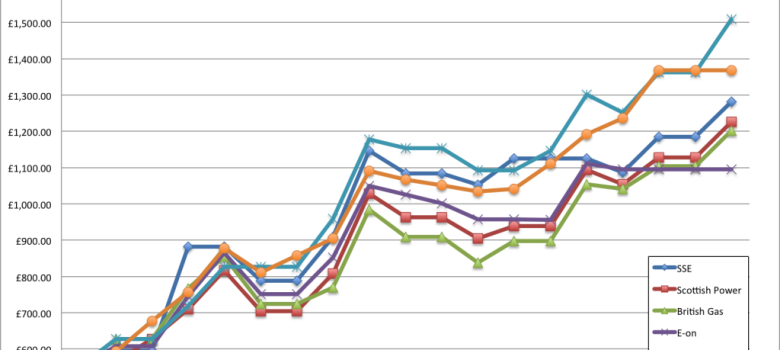
Ahead of the Autumn Statement, which is due to be announced on 5th December, I thought I would take a look at the Energy Company Obligation (ECO).
ECO is just one of a number of Government policies aimed at increasing energy efficiency, however there is currently much media speculation that it could undergo drastic reworking over the coming weeks.
The media speculation may well hold some truth as this autumn, 5 of the big 6 energy companies have put up their energy prices as per the table below (E.ON is yet to announce anything), but one of them – EDF – raised their prices by only 3.9%.
| Energy firm | Gas | Electricity | Start date |
| SSE | 8.20% | 8.20% | 15-Nov |
| British Gas | 8.40% | 10.40% | 23-Nov |
| NPower | 11.10% | 9.30% | 01-Dec |
| Scottish Power | 8.50% | 9% | 06-Dec |
| EDF Energy | 3.90% | 3.90% | 03-Jan |
The reason given for only a 3.9% increase?
The firm (EDF) said: “The company has taken action ahead of the outcome of the Government’s review (e.g. the Autumn Statement) of the costs of ECO and other schemes.
“If the Government makes bigger changes to the costs of its social and environmental schemes than EDF Energy has anticipated, the company pledges to pass these savings onto customers.
“However, if changes to social and environmental programmes are less than anticipated, the company may have to review its standard variable prices again.”
So what exactly is ECO?
ECO is the energy efficiency scheme paid for by the energy companies that is primarily designed to help vulnerable members of society like the elderly and those on specific Government entitlements, and those members of society that are the biggest risk of falling into fuel poverty.
In addition the scheme is also being used to target the improvement of solid wall properties and those that have ‘hard-to-treat’ walls (this is the first energy efficiency scheme that has targeted this).
You can find out more about ECO here.
Why is ECO needed?
The Office of National Statistics estimated 31,100 excess winter deaths in England in Wales during 2012-2013, and the majority of these people fell into the vulnerable members of society demographic – the demographic specifically targeted by this ECO scheme.
By providing free cavity wall insulation, loft insulation and new boilers, this group of people can then heat their homes for less. To date 270,000 homes in the UK have benefitted from the scheme in this year alone, so clearly as a mechanism for getting energy saving solutions into peoples homes it is working, despite previous reports to the contrary.
So why are the energy companies so against ECO?
The main reason why energy companies are so against ECO is that they have to fund it – and they are doing this by passing on the costs to their customers through increased energy bills.
Obviously in the current economical climate, where the price of such an essential commodity (energy) is increasing way above inflation – the suppliers are going to come under attack from many different quarters.
Every year for the last 8 years, energy prices have risen between 8-10%, so while an average bill in 2004 was £522 it has now reached £1309 – at this point it is important to emphasise that ECO has only been around for 1 year, so one would certainly be forgiven for questioning why the energy companies have been able to get away with their annual price rises in previous years.
Anyway, since ECO is Government policy – it can be changed (unlike for example, the cost of importing fuel from the Middle East). It therefore has become an incredibly easy target for the energy companies.
They argue that if ECO is scrapped, energy prices will come down and the savings will go directly back to the customers.
Is Funding ECO through Energy Price Rises Fair?
I think it is fair to say that more vulnerable members of society need the help of others. They shouldn’t be unable to afford to heat there homes, so I truly believe there does need to be something in place to help them and ECO has worked to date (look at the take up numbers).
Now if these vulnerable members of society don’t take up the measures available to them through ECO, and they pay their energy bills, there are having to pay more to help others in a similar position benefit, so there are quite strong arguments that ECO is a regressive tax.
So it is a tough call to make, I think there is no doubt though that we do need an energy efficiency program to help vulnerable people, whether it should be funded via the companies or through increased tax – that is up for debate and I am sure in the coming weeks we will hear plenty on the subject
Is Energy Efficiency in the best interests of the Energy Companies?
Energy efficiency means that the same quality of heating effort can be achieved for less effort; or to make it slightly more relevant to consumers, they can keep their homes warm by using less gas and so provide cheaper energy bills.
If everyone in the UK were to retrofit their properties with insulation, peak energy demand would dramatically decrease and then in theory the UK could reduce imports of gas and produce less electricity.
Therefore there is no real surprise the energy companies are kicking up a fuss here, if everyone eligible were to take advantage of the scheme, then there would be a lower requirement for fuel (both gas and electricity) and that would bite into their profits even more.
If this type of scheme ceases to exist, homes will stay uninsulated – energy demand will stay constant and since we have to import such a proportion of gas from such volatile areas of the world, gas prices will no doubt go up in the long run, so yes we could see immediate reductions in our energy bills today by Government revoking ECO, the bills would be back up at the same level in a couple of years and no measures would have been installed.
A final Thing to Think about!
The final thing to consider is that the same energy companies that deliver the energy to your homes also produce the energy (from power plants or getting gas out of the ground).
In their bill breakdowns, the energy companies claim that 48% of your bill is made up from wholesale energy costs.
Now despite the energy companies reporting just a 5% profit in selling the energy to you, their energy production arms reported profits of 20% or more for this year (was nearer 25% last year). So they are selling gas/ electricity to themselves at a 20% profit, and then selling it on again to customers at a 5% profit – and they claim that social and environmental costs are the drivers of high bills…
I think not!












No Comments yet! Be the first one.